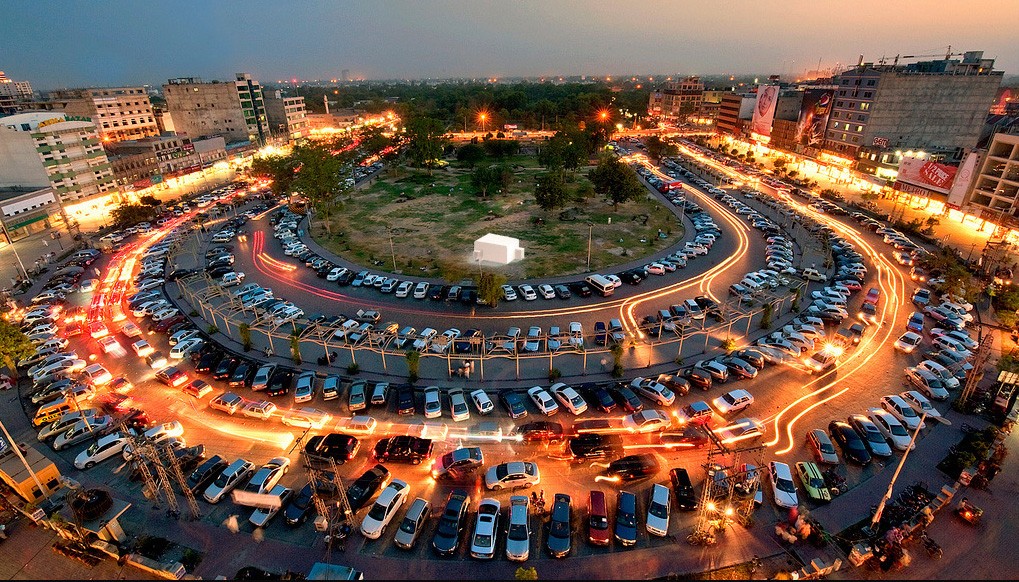
The Lahore Biennale, expected to be the premier showcase of contemporary arts from all over the world, is all set to have a finale in 2016

Imagine a walk through the fabulousness of Venice, feel like a Venetian or a traveller, drown in the city’s hopeless romance -- without having to fly over continents, without braving the mundane drudgery of travel… ah, really, it’s so dreamlike!
Renowned contemporary artist Rashid Rana is about to take Lahoris on this fantastical journey. His installation, an extension of his Venice Bienalle project, ‘My East is Your West’, to be put up in Liberty Market soon, will replicate Plazzo Benzon in Venice. This space in Lahore will feature a video projection of live feed from a mirrored space in Venice. The backdrop will be the same, yet you will view completely different faces and activities on either side of the world. It will be in one sense a replication and yet a dislocation of space.
Rana’s artwork, and a bundle of other art activities, will together form the Lahore Biennale, which is expected to be the premier showcase of contemporary arts from all over the world.
Set up in 2013, the Lahore Biennale Foundation (LBF), a non-profit organisation, run by a team of prominent artists and curators of national and international acclaim, through their initiative of Lahore Biennale hope to cover "critical sites for experimentation in visual expression and experience, seeking to challenge and expand the scope of both", explains the Foundation’s manifesto.
"We want to bring art in the public sphere. We want to break institutional boundaries, reach out to as many people as possible, and encourage platforms where dialogue can go on," says Qudsia Rahim, executive director LBF, while sitting in a square room with white walls in a senior architect’s office in Lahore’s Muslim Town. Her team comprising young art school graduates surrounds her. Talking on their behalf too, Rahim excitedly adds, "We just want to have fun with arts".
She thinks the environment is ripe for a dialogue to be created through arts in the country.
Though Lahore Biennale is based in Lahore, it is not "landlocked". The Foundation intends to reach out country, region and world-wide. Rahim aims to connect Pakistani people with art created and exhibited abroad. "We know, say, Imran Qureshi displayed his wonderful art in New York. But we never get to see it. We hear about films made by Pakistani filmmakers submitted for international award. But we never get to see them. Likewise for music. Lahore Biennale will bring all that from New York or London to our people. And, through Rashid Rana’s installation at Liberty we plan to achieve just that."
LBF does not follow a chronology as such because "it seeks to imagine possible pasts and futures as featuring in today", yet it has a year round calendar of discursive activity that seeks to provide a sustained environment for hosting conversations, intuitions and investigations into visual expression and experience. Among the projects held so far is Rashid Rana and Shilpa Gupta collaboration, ‘My East is Your West’, facilitated by LBF and Gujral Foundation from India and exhibited at the Venice Biennale. It has partnered a workshop, Theertha Performance Platform, held in Sri Lanka where participating performance artistes were encouraged to work within the theme of ‘Borders and lines: the temporality of landscape’.
The Foundation has already released an open call for artists’ residency, a LBF-Habib University collaboration and is in the process of inviting entries for a photo journal to connect with public. "The finale will be in 2016," says Rahim. "We are not talking too much about it. We are planning."
Most of the future Biennale projects and grants will be through open calls and an independent jury will do the selection.
Although the LBF team admits that a curator will have a central role in the showcasing of art, they have yet to appoint one. "We are all debating… and we love this debate about a curator or curators; whether the curator should be local or come from overseas, whether he should be from within the system or someone totally new to our own art world, whether one curator or a panel of curators. We are thinking all the time," says Rahim.
There is certainly a buzz surrounding Lahore Biennale. "It promises to be a great beginning," agrees Sameera Raja, curator and founder of the Canvas Gallery in Karachi. "Anything to do with art is needed in Pakistan."
Raja feels in our country art is confined to art people only. "Initiatives such as Lahore Biennale will engage with populace and will make art accessible to many many more," she says.
Lahore Biennale is still in its early stages and since there is no precedent of such an art event in past, says art critic and painter Quddus Mirza. "It will carve its own shape and structure. What it will turn out to be cannot be predicted."
He feels that Biennale could be "more interactive, inclusive and broad-based," he says, while placing full trust in the "brilliant and energetic LBF team". "This first of its kind event will perhaps also make artists think about content, execution, display and projection of their work," says Mirza.
Ultimately, it will be up to art lovers to interpret the Lahore Biennale as they wish. It may take them places, as art can take you anywhere.